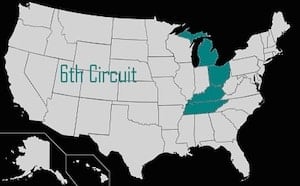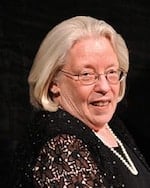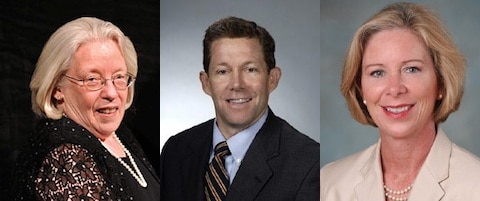The Cincinnati-based Sixth Circuit Court of Appeals will hear oral arguments in a series of marriage equality cases today from the jurisdiction's four constituent states: Kentucky, Michigan, Ohio, and Tennessee. It is an unprecedented coming together of marriage equality litigation that has the potential to change the destiny of marriage in the federal courts for several reasons:
 First, these cases cover the entire Sixth Circuit and any decision could affect all of them directly, even if a decision is stayed pending appeal to the Supreme Court. We have seen this happen in the Fourth Circuit, where the appellate court overturns a ban on marriage equality and other states in the circuit, North Carolina and West Virginia, either stop defending their own bans or take other pro-equality actions because they see the writing on the wall even though the decision is stayed pending appeal.
First, these cases cover the entire Sixth Circuit and any decision could affect all of them directly, even if a decision is stayed pending appeal to the Supreme Court. We have seen this happen in the Fourth Circuit, where the appellate court overturns a ban on marriage equality and other states in the circuit, North Carolina and West Virginia, either stop defending their own bans or take other pro-equality actions because they see the writing on the wall even though the decision is stayed pending appeal.
Second, the three-judge panel reflects the right-of-center tilt of the circuit, consisting of a Clinton appointee and two George W. Bush appointees, one of whom has made his fiercely conservative views public.
And, third, as the third federal appeals court to hear a post-Windsor marriage case — after the Tenth (the Utah case) and the Fourth (the Virginia case), but before the Seventh (on August 26), the Ninth (on September 8), and at some point, the Fifth — the Sixth Circuit is being watched to determine if a pattern is emerging among the circuits or if there will be a split among the panels.
AFTER THE JUMP, I summarize the cases and briefly profile the judges on the panel. I will also discuss a few things to watch for during the marthon oral argument, scheduled to being at 1 PM.
CONTINUED, AFTER THE JUMP…
The six cases being argued today are as follows:
DeBoer v. Snyder (plaintiffs pictured): In Michigan, the up-for-reelection Republican governor appeals a judge's decision finding that that the state's constitutional amendment prohibiting same-sex marriage violates the equal-protection clause. The decision followed a bench trial that, among other things, completely obliterated the credibility of the antigay "expert" Mark Regrenus and his ridiculous study.
Obergefell v. Himes and Henry v. Himes: Ohio appeals two district court decisions that the Sixth Circuit consolidated into one, requiring the state to recognize valid out-of-state marriages between same-sex couples on Ohio death and birth certificates. Although the facts are narrower here, the decision would affect ban on gays marrying in the state, in general.
Bourke v. Beshear and Love v. Beshear: Democratic Kentucky Governor Steve Beshear appeals two district court orders declaring unconstitutional Kentucky's prohibition against recognizing valid out-of-state same-sex marriages and its prohibition against same-sex marriage. Notably, Governor Beshear hired private, outside counsel to argue in support of the ban because his elected attorney general and candidate for governor, Jack Conway (D), refused to defend the ban on principle.
Tanco v. Haslam: Tennessee appeals a district court's ruling that the state must respect the marriages of three same-sex couples who were legally married out of state. Again, although the case is narrower than, say, Michigan's, the decision will affect the state's general ban on gays marrying.
The Judges
All appellate court cases get hearings before three-judge panels of the circuit. Hearing these cases today will be the following judges:
 Martha Craig Daughtrey (right), a senior judge and Clinton-appointee, has a long tradition of progressivism. She has opposed the death penalty and has supported affirmative action in her opinions.
Martha Craig Daughtrey (right), a senior judge and Clinton-appointee, has a long tradition of progressivism. She has opposed the death penalty and has supported affirmative action in her opinions.
Deborah Cook (top photo, right), a George W. Bush appointee, has a more conservative history dating back to her time on the Ohio Supreme Court.
Jeffrey Sutton, another Bush appointee, is likely the most conservative on the panel. He has written fiercely conservative treatises in leading law reviews. In the LGBT arena, he wrote an opinion reinstating a suit filed by a Julea Ward, a graduate counseling student and evangelical Christian who was expelled from Eastern Michigan University when she refused to work with gay persons.
But all hope is not lost. Judge Sutton (and Judges Cook and Daughtrey, for that matter) is not a straight party-line judge. He may conservative in some areas, but he also issued a decision upholding the constitutionality of Obamacare.
Although we cannot tell how these judges will decide the marriage equality cases simply from their political affiliations and which president appointed them, it is worth noting that, at least with respect to marriage cases, the party of the nominating president has not always mattered much. Sure, the antigay Judge Niemeyer in the Fourth Circuit was appointed by a Republican. But many of the district and appellate judges who have tossed bans on marriage equality — even including those judges that tossed DOMA — have been Republican appointees.
What Else to Watch For?
 Where are the questions going? Oral argument questions do not always show how a judge will rule, but they can. Pay attention to the questions from Judge Cook and Judge Sutton (pictured, right), in particular. Judge Cook is a rigorous jurist and Judge Sutton may be conservative, but he is not blindly so.
Where are the questions going? Oral argument questions do not always show how a judge will rule, but they can. Pay attention to the questions from Judge Cook and Judge Sutton (pictured, right), in particular. Judge Cook is a rigorous jurist and Judge Sutton may be conservative, but he is not blindly so.
The conservative panel gives us the best chance yet for an anti-equality ruling, even though I find that unlikely given the legal consensus emerging from our post-Windsor 30-court winning streak. But if we do get an anti-equality ruling, that means we will have a split among the circuits on the legality of the bans, thus ensuring at least one of the marriage cases will be taken up by the Supreme Court. If not, if we see another pro-equality ruling, the consensus holds and, as I have argued before, there may be no reason for the Supreme Court to take the case.
Equal protection or due process? We have recently seen several cases decided under the Due Process clause, calling marriage a fundamental right, rather than the Equal Protection clause, arguing that treating gays differently than heterosexuals is wrong. What this panel appears to be interested in matters because we are still trying to understand what Justice Kennedy meant in his Windsor opinion and if lower court decisions claim he called the right to marry "fundamental" and those decisions get reviewed at the Court, that could result in a very different case and majority alignment if, as some scholars argue, Kennedy is none to eager to dive into the fundamental right ocean.
Broad or narrow? These cases have the potential to eradicate marriage discrimination in the entire Sixth Circuit. Or, the judges could limit their decisions to the specific facts in Ohio and Tennessee and force advocates in those states to return to court to get full marriage equality. Keep an eye out for whether the judges are concerned about issuing decisions that are too broad.
***
Follow me on Twitter and on Facebook. Check out my website at www.ariewaldman.com.
Ari Ezra Waldman is a professor of law and the Director of the Institute for Information Law and Policy at New York Law School and is concurrently pursuing his PhD at Columbia University in New York City. He is a 2002 graduate of Harvard College and a 2005 graduate of Harvard Law School. Ari writes weekly posts on law and various LGBT issues.





